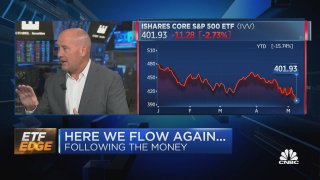
During April's ugly sell-off, the ETF industry suffered monthly net outflows of $6 billion, breaking a string of inflows dating back to August 2019.
Faced with a multitude of risk factors, investors are finding it tough to sift through the noise. But ETF flows can offer a good glimpse into the lay of the land, Tom Lydon, Global CEO of ETF Trends, said on CNBC's "ETF Edge."
He noted inflation and commodities trends are the strongest they've been in 40 years, with more money pouring into commodity-based ETFs than into U.S. fixed income ETFs this year.
Get Boston local news, weather forecasts, lifestyle and entertainment stories to your inbox. Sign up for NBC Boston’s newsletters.
Fixed income
Despite talk of the traditional 60/40 portfolio breaking down, Lydon said we still haven't seen big outflows from bond funds.
The iShares Core U.S. Aggregate Bond ETF (AGG) — the world's largest bond ETF — is down 10% this year. Yet fixed income ETFs have accrued roughly $20 billion in inflows in 2022, which is relatively scant but still a net positive.
Money Report
Investors have also parked a record amount of money in cash and money market funds, along with short-duration ETFs.
Equities
According to ETF Trends, U.S. equity ETFs bled a record $28 billion last month, led by plain-vanilla ETFs like the SPDR S&P 500 ETF (SPY), the iShares Core S&P 500 ETF (IVV) and the Vanguard S&P 500 ETF (VOO), which, combined, saw $32 billion in net redemptions.
Mega-cap technology-weighted portfolios are clearly bearing the brunt of the pain. As growth stocks take a hit from rising interest rates, many investors are diversifying away from the tech-heavy S&P 500 index.
The so-called FAANG stocks, along with Microsoft and Tesla, account for nearly 25% of the S&P 500's entire market cap, but all have underperformed the broader benchmark index so far this year, with Apple entering bear market territory.
Still, there is some evidence of dip buying, at least when it comes to high-growth, speculative stocks. Cathie Wood's ARK Innovation Fund (ARKK) continues to attract assets as investors look to take advantage of the massive decline in disruptive technology.
Wood's fund boasted 190 million shares outstanding back in April of 2021, and still has 190 million shares outstanding today. That means no net outflows, even after a 70% plunge from recent highs. ARKK has broken below its pandemic lows back in March of 2020 before bouncing back on Friday.
Lydon said Wood's loyal following should come as no surprise. "If you believe in her premise, if you believe in the game plan that she's gotten in place and can buy her for 60% off compared to a year ago," it's a no-brainer buy.
Financial advisors' top concerns
Out of a bevy of macro risks, what are financial advisors most worried about?
ETF Trends surveyed thousands of advisors in the past month to determine what's keeping them up at night.
Inflation and rising rates (43%)
Chief among those concerns is rising interest rates and inflation. Many advisors have been disappointed in the Federal Reserve's response to tackling inflation — and feel they'll embrace a less hawkish policy stance than perhaps they should.
Geopolitics (34.5%)
The second-biggest concern is geopolitical turmoil, as Russian President Vladimir Putin reportedly prepares for a long war ahead with Ukraine.
Prolonged economic slowdown (12.5%)
Third on the list is fear of a possible prolonged economic slowdown or recession. Fed Chair Jerome Powell has said he can't guarantee a soft landing as the committee fights to stave off inflation.
Market volatility (8%)
Fewer than 10% are concerned about stock market volatility, as traders have grown increasingly desensitized to the dizzying movement.
Dividend sustainability (2%)
Just as the market has been emotionally charged, Lydon said ETF flows can be emotionally driven.
"You talk to advisors, they're not [as] concerned about the volatility in the equity markets as they are [with] rising interest rates and what inflation is going to do when you look at that fixed income portion," he said. "If your client is close to retired or retired right now, the outlook for fixed income is fairly bleak."






